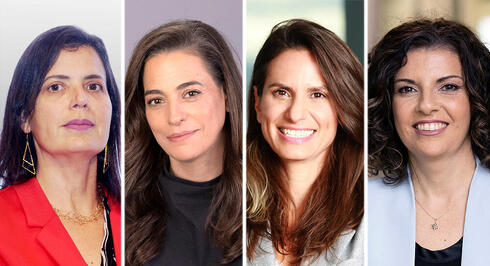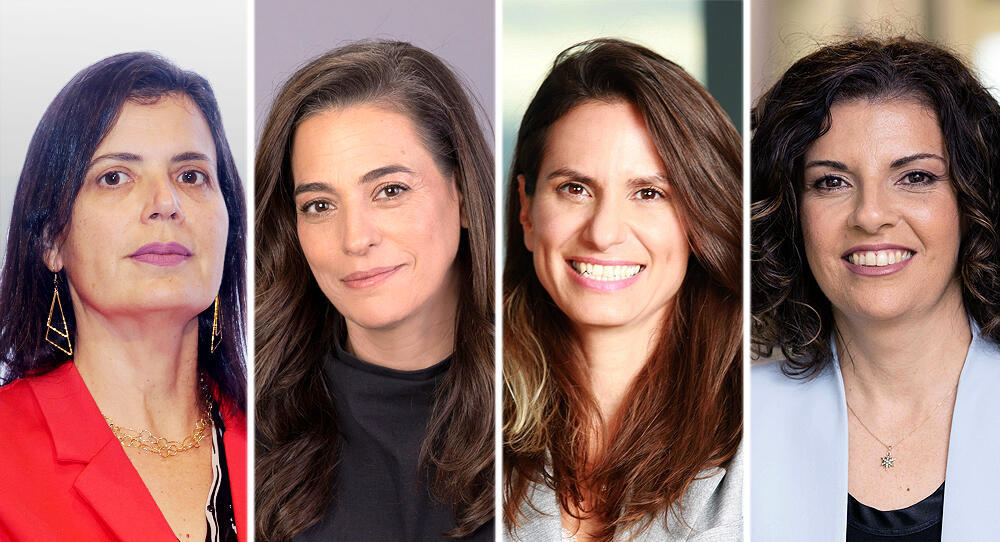
"AI is an opportunity to close gender gaps"
The Shavot association has been working for six years to reduce gender inequality. In the flagship project "Girl's Week" that took place last week, pioneering women gave inspirational lectures to girls and teenagers
If you ask girls in kindergarten what they want to be when they grow up, they answer astronauts or pilots, but then, in adolescence, their self-confidence drops by an average of 30%. Alongside this, their perception of risk increases, which means that a fear of failure develops. "It starts in adolescence and does not converge to a positive place when we leave puberty, but the other way around," says Maayan Arzi-Mlinarski, CEO of the Shavot association, which has been working for six years with the aim of reducing the gender gap. "Even in adolescent boys there is a loss of self-confidence, but around the age of 16 they reduce this gap and girls do not," she says.
1 View gallery


From left: Amalia Avramov, Maayan Arzi-Mlinarski, Rinat Zilberstein, Hila Mukevisius
(Osnat Rom, Adi Orani, Orel Cohen, Tal Shahar)
According to her, another pattern that hurts women is attributing success and failure. "Girls tend to attribute failure to internal factors, meaning if I didn't succeed in something, I'll say I'm bad at it, and that's not always true, it could be that I didn't succeed because I wasn't focused," she says. "It's also about giving up on the next attempt, because if I'm bad why should I try again? Success, on the other hand, is attributed to external factors. That is, if I succeeded then I was probably lucky or everyone else succeeded. Girls have a tendency to minimize success and we know it too from the world of work - also from mature women. And this is the opposite of boys, whose tendency is to attribute success to internal factors and failure to external factors."
Shavot aims to correct these factors in order to increase gender equality. The activity of the association focuses on teenage boys and girls, with the peak of activity being the "Israeli Girl's Week", which was last week, during which inspirational lectures are held by pioneering women with the aim of stimulating discourse on gender equality among teenage boys and girls and exposing girls to inspiring female models.
"We are busy all year giving girls a set of tools that will allow them to build their self-confidence and self-esteem and realize their potential. The more a girl sees significant women, the more her sense of ability will increase. A 12-year-old girl is not planning a career, but she definitely needs to know that you can be whatever you want, that it is possible," says Arzi-Mlinarski.
Almost 3,000 women participated in the Israeli Girl's Week this year, volunteering to give lectures to girls and teenagers, and the association noted a significant increase both in the level of interest on the part of the schools and on the part of the women lecturing.
"The girls Shavot has chosen to work with are at a very critical juncture," says Rinat Zilberstein, CEO of AT&T Israel and Vice President of AT&T Global. "I think the ability to have an influence at a young age is the key. In my case it was my mother who, when I had the dilemma of which subjects to work harder on in high school, she pushed me to study mathematics and physics. She made me understand that you don't have to be afraid of it and you have to jump into the water and then as soon as you have grades in math and science - even if they are just okay and not excellent - many doors open. Doors opened for me in the army when I received invitations to all the most prestigious roles, then the people who were with me in the army were the ones who recruited me for my first job after the army. This decision to focus on physics and mathematics was a critical juncture for me because all things basically rolled out from there and girls don't necessarily understand the impact this decision has on their lives."
Amalia Avramov, President of Amdocs Financial Services, believes that the introduction of artificial intelligence (AI) tools is a historic opportunity to increase gender equality. "AI is becoming something that reshapes the way we work, live and communicate, and this is an extraordinary opportunity to close the gaps, to create diversity and female leadership. Once technology represents humanity as it is - with 51% women - then we can embed equality in a way that it would not be so easy to give it up," she says.
Avramov says that Amdocs works to encourage girls to actively participate in the worlds of artificial intelligence. "Part of our commitment is to empower women by using the tools and knowledge needed to upgrade their skills and succeed with the changing technology," she says. "We created a lesson framework that we distributed so that every employee at Amdocs can voluntarily teach it, for example at their children's school. We included examples that represent equality of women in leadership and technology positions, so that boys and girls in schools will also be exposed to Generative AI in an equal way."
For Avramov as well, the crossroads that led her to success was her choice of high school studies and then being accepted into MAMRAM (the IDF’s Center of Computing and Information Systems). "Before the army, we didn't have a computer at home and I didn't know what computers were, but I didn't hesitate just because I knew it was difficult to get accepted. The unknown fascinated me. I was accepted and entered the world of technology," she says.
Partners for decision-making
Hila Mukevisius, Senior Vice President for Human Resources at the Strauss Group, tries to instill in her three daughters the belief and values that they can succeed and fulfill every ambition and dream they have if they only study, put in the effort and believe: "Unfortunately, we see very few women in decision-making positions in Israeli society, whether in the public sector or in the elected or private sectors. The elections for the local authorities were held just recently, and even there we saw a very small proportion of women elected to serve as the head of a municipality. The choice to strive for gender balance is a conscious and stubborn choice, which comes with the assimilation of processes, of broad and courageous leadership concepts. Integrating women into organizations requires a lot of systematic and continuous investment, which requires a change in habits and patterns."
At Strauss, where a woman, Ofra Strauss, serves as the chairman of the board, there are 48% women in management positions and there is a female majority on the board. "From my experience, gender balance is what is right for women and men in general, but also for us as a business at Strauss," she emphasizes. "In the survey we did, we discovered that 75% of the decisions to buy our products are made by women, so it is only logical that women be partners in making decisions about a product or service. Our resilience as a business-manufacturing company is built on the variety of skills of our people and our ability to realize this potential. Since October 7, both women and men have been enlisting in the reserves, the women in the current war are taking on a significant role both on the front line and on the home front."













